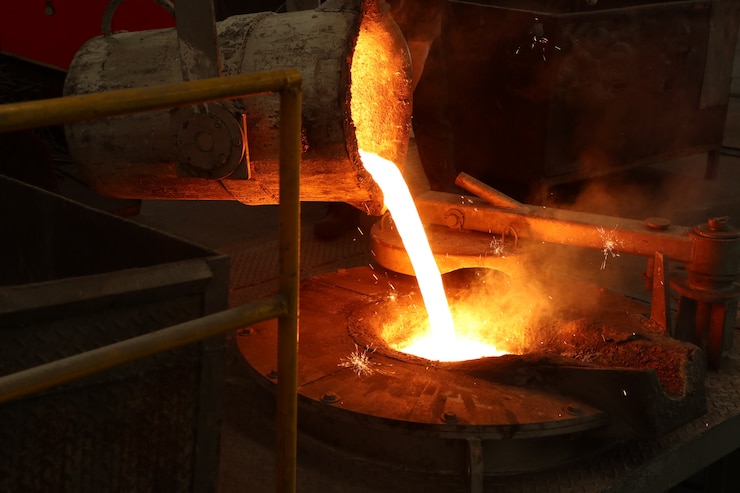Casting is one of the most precise methods of manufacturing metals and has extensive use in the automotive, aerospace, construction, and consumer goods sectors.
With India being one of the largest casting producers in the world, it has relied on the 10 most commonly used metals in a bid to establish cost-effective and sustainable solutions.
Strength, corrosion resistance, conductivity, or light weight, based on the use, are some of the criteria used in the selection of these materials.
In this guide, we discuss the 10 Most Commonly Used Metals in casting, and why they are dominant in industrial demand.
1. Cast Iron
Cast iron Casting has been in use for centuries, and it is one of the Commonly Used Metals in India because of its affordability and strength. It is a high-carbon substance, which implies that it is hard, wear-resistant, and can be used in heavy-duty.
- Applications: Engine blocks, pipes, cookware, manhole covers, and machine bases.
- Advantages: It offers very high strength and is very cost-effective. In addition, it offers excellent machinability.
Cast iron products are in the top 10 most common metals used, with foundries located in Gujarat and Maharashtra dominating the production of cast iron products.
2. Steel
The other most versatile Commonly Used Metals in casting is steel. It is a combination of 2 different metals. Iron and Carbon, when mixed, will form steel. Also, among other elements, in order to create high tensile strength and durability.
- Applications: In heavy machinery, automotive parts, gears, structural components and valves.
- Advantages: Steel is adaptable to almost every treatment, which makes it the best. It has a very high strength-to-weight ratio. Also, it is purely resistance to deformation.
With the automotive and infrastructure industry in India expanding rapidly, steel castings are in demand, and this is another priority reason as to why it made it to the list of 10 most commonly used metals.
3. Aluminum
Aluminum is distinguished by lightness and strength. This is among the most desirable Commonly Used Metals to cast when the weight must be lowered without structural loss.
- Applications: Aerospace components, automotive engine parts, packaging, and household products.
- Advantages: Offers very good conductivity to electricity and is very lightweight. It is resistant to corrosion and is highly thermal.
4. Copper
Copper is a conductive thermal and electrical metal and thus one of the Commonly Used metals in casting and electricity.
- Applications: Majorly used in decorative pieces, Electrical connectors, industrial equipment, and plumbing fixtures.
- Advantages: It has many antimicrobial properties. Also, they are very good at conducting electricity. Similar to the above metals, it is also resistant to corrosion.
Copper castings are greatly sought after in electrical and power transmission sectors, and as such, India, which is one of the largest importers of copper in the world, puts the copper castings in the 10 most commonly used metals list.
5. Zinc
Zinc is extensively used in die casting, and it is greatly used in items that have finer shapes and thin walls. It is among the lightweight Commonly Used Metals which are easily alloyed with others.
- Applications: Automotive parts, electrical equipment housings, door handles, toys, and small gears.
- Advantages: Zinc has a very low melting point. In addition, it prevents corrosion.
Zinc castings play a significant role in the consumer goods industry of India to the extent that it is considered a staple in the most commonly used metals in casting.
6. Magnesium
Magnesium is regarded as the lightest structural metal and tops the list of the 10 most commonly used metals to cast. It is really strong and machineable in spite of being lightweight.
- Applications: Aerospace parts, automotive wheels, electronics housings, and military components.
- Advantages: Similar to Aluminum, Mg also has a very low weight. It is strong and is good at shock-absorbing.
As India rises in both the defense and aerospace sectors, magnesium casting is becoming relevant as a Commonly Used Metal in Special purposes.
7. Nickel
Nickel is appreciated due to its toughness, heat resistance, and capacity to resist corrosion. It is usually mixed with other Commonly Used Metals in order to improve their properties.
- Applications: Medical devices, marine equipment, Turbine blades and industrial machinery.
- Advantage: It is very durable with a very high melting point. It also prevents corrosion.
Nickel is an influential rival in the list of 10 most commonly used metals since nickel alloys play a major role in the energy and chemical industry in India.
8. Tin
Tin is not as strong as steel or iron, but one of the Commonly Used Metals in casting since it is not subject to corrosion and can be applied in various ways. Tin is commonly mixed with copper a lot to form bronze.
- Applications: Food containers, bearings, decorative items, and for use in soldering.
- Advantages: Tin is one of the best metals as it is easy to cast and very non-toxic. It also prevents corrosion.
In India, tin castings are popular in consumer goods and traditional crafts, and it has retained its position in the list of 10 most commonly used metals for practical uses.
9. Bronze
Bronze, which is an alloy of copper and tin, has been one of the earliest Commonly Used Metals in casting since the ancient civilization of India. It offers not only great strength but also beauty.
- Applications: Marine & architectural hardware, bearings, Sculptures, bushings, and decorative items.
- Advantages: It gives a good finish and very low-friction in nature. It also offers high resistance to corrosion.
In India, we have had a significant tradition of bronze casting, particularly in religious idols and arts (the famous Chola bronze statues), and it is still relevant in modern-day industries, one of the 10 most commonly used metals.
10. Brass
Brass is a copper-zinc alloy, a golden colored metal that is known for its excellent machinability. It is one of the most useful and decorative Commonly Used Metals in casting.
- Applications: Musical instruments, fittings, valves, decorative applications, and locks.
- Advantages: CoBrass is very good at mechanical properties and highly resistant to corrosion. It also gives aesthetic appeal.
In India, Brass has cultural value and industrial demand, making it part of the 10 most commonly used metals in casting.
How to Choose the Right Metal for Casting?
Choosing the best option among the 10 most commonly used metals is dependent on many criteria. Manufacturers usually look at:
- Strength & Durability: Steel and cast iron in heavy-duty applications.
- Light Weight needs: Low weight products of aluminum and magnesium in aerospace and automotive applications.
- Corrosion Resistance: Copper, bronze, and brass weight corrosion resistant plumbing and decorative uses.
- Cost Efficiency: When making considerations, zinc and tin are cost efficiency metals used in consumer products.
By looking at these attributes industries can make more informed decisions about how to enhance the efficiency and increase the useful life of their casting products.
Conclusion
Casting represents a foundation of modern manufacturing in India. The strong stability of cast iron and steel and the easy castability of aluminum and magnesium are only some of the various primary applications of each of the 10 most commonly used metals.
These commonly used metals possess varying applications and are selected by manufacturers based on many factors, varying in terms of strength, weight, corrosion resistance, and economic considerations.
These metals are vital to the various industries, whether it is the construction of aircraft engines or even household pans or ornamental art.
When you have an organization that requires precision-cast, high-quality castings, RM Technocast has been a proven and most reliable provider in India, whose products and services satisfy and surpass global standards of casting, and is engaged in numerous sectors.
FAQs
1. What are the most commonly used metals in casting?
The 10 most commonly used metals in casting include Cast Iron, Steel, Aluminum, Copper, Zinc, Magnesium, Nickel, Tin, Bronze, and Brass. Each metal offers unique properties such as strength, corrosion resistance, or light weight, making them suitable for different industrial applications.
2. Which metal is best for casting heavy-duty components?
For heavy-duty components like engine blocks, machinery bases, and valves, cast iron and steel are the preferred metals due to their high strength, durability, and wear resistance.
3. What metals are commonly used for lightweight casting applications?
Aluminum and Magnesium are ideal for lightweight casting applications such as automotive and aerospace parts. They offer excellent strength-to-weight ratios and corrosion resistance while reducing overall component weight.
4. Which metal offers the best corrosion resistance in casting?
Copper, Bronze, and Brass are highly corrosion-resistant and are often used for plumbing fittings, decorative items, and marine hardware where long-term durability is essential.
5. What are the advantages of using Zinc in casting?
Zinc has a low melting point, excellent fluidity, and is ideal for creating detailed, thin-walled components through die casting. It’s also cost-effective and corrosion-resistant, making it perfect for automotive and consumer products.
6. Why is Cast Iron still so widely used in India?
Cast Iron remains one of the most widely used casting metals in India due to its affordability, excellent machinability, and suitability for heavy-duty applications. Foundries in Gujarat and Maharashtra are major producers of cast iron products.
7. How do manufacturers choose the right metal for casting?
The selection depends on factors such as strength, weight, corrosion resistance, cost, and end-use. For example, steel and iron are chosen for durability, while aluminum and magnesium are selected for lightweight needs.
8. What industries commonly use metal casting in India?
Metal casting is widely used in automotive, aerospace, construction, railways, defense, and consumer goods sectors. India is one of the world’s leading casting producers serving both domestic and international markets.
9. Why is RM Technocast a trusted name in metal casting?
RM Technocast is known for precision-engineered, high-quality castings using advanced techniques and strict quality control. The company provides reliable casting solutions across various industries, ensuring performance and consistency that meet global standards.



